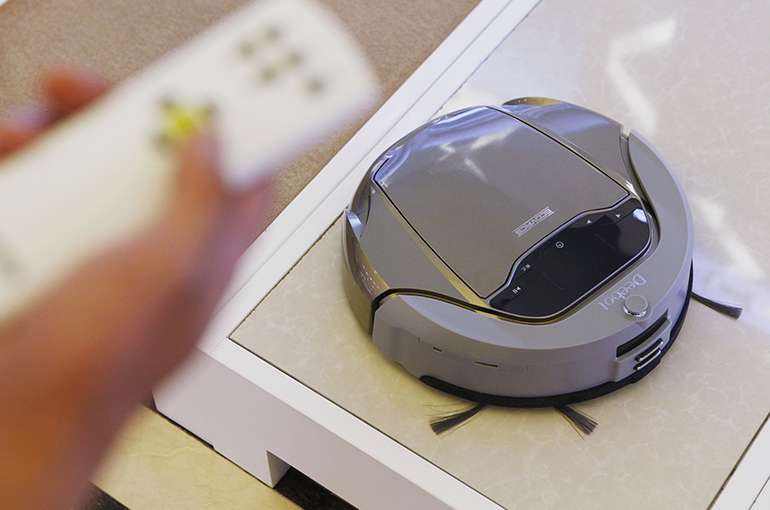 CEO's Outburst Reveals Higher Stakes in China's Robot Vacuum War
CEO's Outburst Reveals Higher Stakes in China's Robot Vacuum War(Yicai) Aug. 23 -- Ecovacs, the world's largest cleaning robot developer by shipment, has laid bare the brutal, dog-eats-dog competition in China's home cleaning gadget segment.
Qian Cheng, CEO of Ecovacs who was born in 1990, hit out at an invisible rival at a new product launch event on August 17.
"Products that are copycats can only resemble the original in appearance, let alone delivering any user experience," said Qian, who took over the helm of Ecovacs in 2019 from his father Qian Dongqi.
It's rare for a CEO of a listed company with a market cap of around 41.53 billion yuan to begin a product launch by openly criticizing an opponent, which he did not name.
Market observers believe Qian's outburst was directed at Dreametech, a fast-growing manufacturer of sweeping robots and other consumer-facing electronics.
Also headquartered in Suzhou and 10 minutes' drive from Ecovacs's head office, Dreametech has evolved into a unicorn on the back of a wide array of products, fast expansion into new categories, enormous discounts on its offerings, expensive marketing campaigns and deep-pocketed financiers.
Dreametech closed a Series C round of funding last year worth a staggering 3.6 billion yuan at a post-money valuation of reportedly 18 billion yuan.
With this cross-town rival fast becoming a tough opponent, Ecovacs has come under pressure to perpetuate its market dominance.
At the product launch, Qian could barely contain his contempt for the unnamed rival when he said Ecovacs held in awe opponents who were serious innovators.
By contrast, it will adamantly oppose blatant acts of imitation and patent infringement, and protect its own rights, Qian asserted.
According to Tianyancha, a business data search services provider, over the past three years, Ecovacs and Dreametech have filed dozens of lawsuits against each other, citing violations of non-compete agreements or intellectual property rights or just pure sleights of hand to undercut competition.
Qian's recent remarks have shone a spotlight on the fierce war simmering in China's smart electronic gadget category.
Industry observers pointed out that slower market growth and escalating rivalry have increased the number of intellectual property disputes between robot vacuum producers.
Spats are also common. When Narwal, a Shenzhen-based developer of cleaning robots, introduced its S1 scrubber in May, it was met with jeer from Yu Hao, founder and CEO of Dreametech.
In an apparent dig at Narwal, Yu wrote in a WeChat post that the technology used on S1 was "outdated" by three years, and he questioned Narwal's timing of releasing such an “anachronism.”
Tables have been turned. With Qian's latest broadside, it's now Dreametech's turn to be put on the defensive.
His remarks are yet another indication of how desperate Ecovacs, a market leader, is to keep competition at bay.
According to AVC, a home appliance market intelligence provider, in 2022, China's robot vacuum cleaner market was divided among Ecovacs, Roborock, Narwal, Xiaomi and Dreametech, with a corresponding share of 39.8%, 21.28%, 15.01%, 9.47% and 6.98%.
In terms of offline retail sales, in the first seven months of this year, Ecovacs dominated the ranking with a 80.5% market share, down 4.4 percentage points year on year but quadruple the shares of all its opponents combined. Roborock and Dreametech finished a distant second and fifth at 10.9% and 2.2%.
Paradoxically, the online sales figures present a quite different picture.
During this year's 618 shopping festival (from May 29 to June 4), the online gross merchandise value of robot vacuum cleaners nationwide hit 1.23 billion yuan, up 4.1% from the same period last year, data from AVC shows.
Of all the suppliers, Ecovacs, Roborock and Dreametech claimed the top three spots in online sales, taking 34.2%, 31.8% and 13.9% of the market, respectively.
The gap is narrowing.
It is perhaps this changing balance of power that prompted Ecovacs to take up arms -- legal or verbal -- more often to mount counterattacks against rivals encroaching on its turf.
The steady erosion of its market share has been a rude awakening to the Ecovacs management, with the young Qian at its core, that continuous innovation is the only way for it to stay ahead of the curve.
Qian did stress the importance of innovation at the August 17 launch event.
"Maybe copycat acts and replications by peers are inevitable, but we believe if we do things in view of consumer demand and industrial development, we will surely lead the whole industry to scale new heights," Qian said.
The kind of innovation he envisages culminated in three new releases, including a circular vacuum cleaner -- a huge departure from the traditional round-shaped design.
Revolutionary or not, Ecovacs's new products will likely spark a new wave of imitations, a shift toward a new norm, and perhaps another dramatic episode in an intensifying war of words.
Robot vacuum has gone from a niche segment into a 12.4-billion-yuan market in the space of three years, according to the latest statistics. This is largely due to enhanced awareness of sanitation and hygiene brought about by the pandemic.
With the industry now focused on increasing the levels of tech sophistication and making the gadgets smarter, companies are expected to spend more on research and development to roll out better products.
The rise of formidable rivals does give Ecovacs a run for its money, but it is exactly this kind of relentless cycle and the higher stakes it entails that push firms to do better and leave us consumers better off.
The author is the founder of cnrobopedia.com, a market intelligence provider focusing on Chinese robotics.